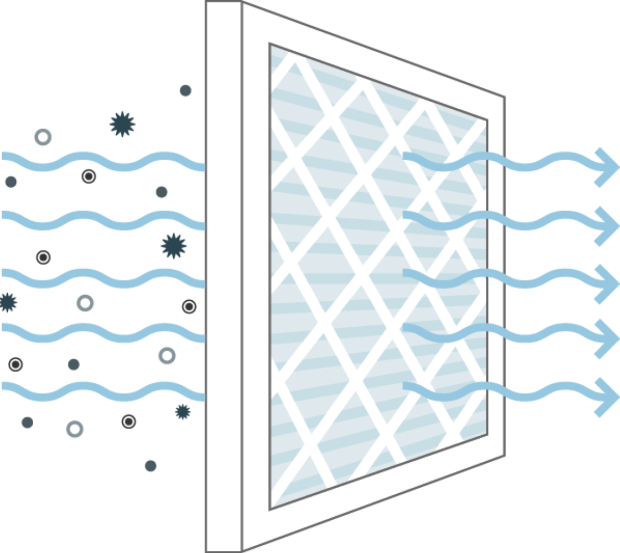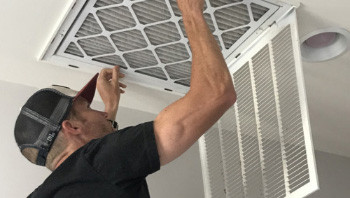- Love Your Lungs: Why Clean Air Is the Gift Your Home Deserves
- Racing Into Cleaner Air: How FilterTime Got Its Start on the Track
- Winter-Proof Your HVAC System: What Every Homeowner Should Be Doing Right Now
- New Year, Fresh Air: 5 Simple Ways to Improve Your Home’s Air Quality in 2026
- Why Indoor Air Gets Worse in the Winter (and What You Can Do About It)

As fall moves in and temperatures begin to drop around the country, we often get asked if a home's heat uses the same air filters as the AC. It is easy to understand where the confusion comes from – people often use different names to refer to their home's air filters. AC filters. Air conditioning filters. Furnace filters. HVAC filters. But no matter what you call them, the answer is yes! Your home's HVAC system which produces both AC and heat uses the SAME air filter, so there is no need to buy separate filters.
Understanding the Purpose of Air Filters in HVAC Systems
Air filters play a crucial role in HVAC systems, including both air conditioning and heating systems. The main purpose of air filters is to trap and remove airborne particles, such as dust, pollen, pet dander, and mold spores. By filtering out these contaminants, air filters help improve indoor air quality and prevent them from circulating throughout your home. Additionally, air filters also protect the HVAC system's components, such as the blower motor and coils, by preventing the accumulation of dirt and debris.
Having clean air filters is essential for the efficient operation of both AC and heat systems. When air filters become dirty and clogged, they restrict the airflow, causing the system to work harder and consume more energy. This can lead to reduced performance, increased energy bills, and even potential damage to the HVAC system. Therefore, regular maintenance and replacement of air filters are necessary to ensure optimal performance and longevity of the system.
Different Types of Air Filters for AC and Heat
While the purpose of air filters is the same for both AC and heat systems, there are some differences in the types of filters used. The most common types of air filters for AC and heat include fiberglass filters, pleated filters, electrostatic filters, and HEPA filters. Each type has its own efficiency level and lifespan.
Fiberglass filters are the most basic and affordable option. They are made of layered fiberglass fibers that capture larger particles but may not be as effective in trapping smaller contaminants.
Pleated filters, on the other hand, have a larger surface area and are capable of capturing smaller particles. They provide better filtration and improved indoor air quality.
Electrostatic filters use an electrostatic charge to attract and capture particles. They are more efficient than fiberglass and pleated filters and are often washable and reusable.
HEPA (High-Efficiency Particulate Air) filters are the most effective in trapping microscopic particles, including allergens and pollutants. They are commonly used in hospitals and clean rooms but may require modifications to the HVAC system due to their high-density construction.
When choosing air filters for your AC and heat systems, consider factors such as filtration efficiency, airflow resistance, and the specific needs of your household. It is recommended to consult with an HVAC professional to determine the most suitable air filter for your system.
Factors to Consider When Choosing Air Filters for AC and Heat
When selecting air filters for your AC and heat systems, there are several factors to consider. These factors include the filtration efficiency, airflow resistance, filter size, and filter lifespan.
Filtration efficiency refers to how well the filter can capture and remove airborne particles. Higher efficiency filters can trap smaller particles and provide better air quality. Learn more about filter quality by watching this short video.
Airflow resistance measures how much the filter restricts the airflow. Filters with high airflow resistance can strain the HVAC system, leading to reduced performance and increased energy consumption.
Filter size is also important to ensure a proper fit in your HVAC system. Using the wrong size filter can result in air leakage and reduced filtration effectiveness. Not sure what size filter you need? Our co-founder Blake Koch explains three things you can do in this short video.
The lifespan of the filter determines how often it needs to be replaced. Some filters may need to be replaced every month, while others can last up to six months or more. Consider your household's air quality, the presence of pets, and the level of outdoor pollutants to determine the appropriate filter lifespan.
By considering these factors and consulting with an HVAC professional, you can choose the right air filters that meet the specific requirements of your AC and heat systems.
Maintenance and Replacement of Air Filters for AC and Heat
Regular maintenance and replacement of air filters are essential to ensure the proper functioning of AC and heat systems. Dirty and clogged filters can restrict airflow, reduce system efficiency, and lead to various issues.

It is recommended to inspect the air filters monthly and replace them as needed. The frequency of replacement depends on factors such as filter type, filter size, household air quality, and system usage.
To maintain the air filters, start by turning off the HVAC system. Locate the filter compartment, which is usually near the return air duct. Carefully remove the old filter and dispose of it properly. Insert the new filter, ensuring it is installed correctly according to the manufacturer's instructions. Finally, turn on the HVAC system and monitor its performance.
Regularly replacing air filters not only helps maintain indoor air quality but also improves energy efficiency and extends the lifespan of the HVAC system. It is a simple yet effective way to protect your investment and ensure a comfortable and healthy indoor environment. Do you forget to change your home's air filters on a regular basis? Try FilterTime's air filter subscription service. When the box delivers, it's a reminder to change your filters.
Benefits of Using Proper Air Filters for AC and Heat
Using proper air filters for AC and heat systems offers several benefits. These benefits include:
1. Improved indoor air quality: Proper air filters effectively remove airborne particles, allergens, and pollutants, leading to cleaner and healthier indoor air.
2. Enhanced system performance: Clean air filters allow for better airflow, preventing strain on the HVAC system and optimizing its performance.
3. Energy efficiency: When the HVAC system operates with clean air filters, it consumes less energy, resulting in lower energy bills.
4. Extended system lifespan: By preventing dirt and debris from accumulating in the system, air filters help prolong the lifespan of the HVAC equipment.
5. Reduced maintenance needs: Regularly replacing air filters reduces the need for costly repairs and maintenance, saving you time and money.
By using proper air filters and maintaining them regularly, you can enjoy these benefits and ensure the optimal performance and longevity of your AC and heat systems.

« Back to News





